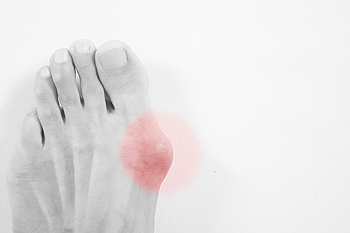(517) 487-5171
Fax (517) 908-0172
Different Reasons a Bunion May Develop
Monday, 24 February 2020 00:00 Bunions, otherwise recognized as a deformity of the big toe, can be incredibly painful when left untreated. They may easily be diagnosed by looking for a bony protrusion on the side of the big toe, and are typically more common among women and elderly patients. However, there are many reasons why someone may develop a bunion, one of those reasons being genetics. Another contributing factor may have to do with your shoes. Those who commonly wear constraining footwear, such as high heels, or cowboy boots, for extended periods of time may be more likely to develop a bunion. Injuries to the foot, as well as arthritis, can both increase your risk of developing a bunion. To help find relief from the pain bunions typically cause, it is suggested that you wear custom orthotics. For more information on treating bunions and how orthotics may help, please consult with a podiatrist for professional care.
Bunions, otherwise recognized as a deformity of the big toe, can be incredibly painful when left untreated. They may easily be diagnosed by looking for a bony protrusion on the side of the big toe, and are typically more common among women and elderly patients. However, there are many reasons why someone may develop a bunion, one of those reasons being genetics. Another contributing factor may have to do with your shoes. Those who commonly wear constraining footwear, such as high heels, or cowboy boots, for extended periods of time may be more likely to develop a bunion. Injuries to the foot, as well as arthritis, can both increase your risk of developing a bunion. To help find relief from the pain bunions typically cause, it is suggested that you wear custom orthotics. For more information on treating bunions and how orthotics may help, please consult with a podiatrist for professional care.
If you are suffering from bunions, contact Dr. Gary Cesar of Michigan Foot and Ankle Center. Our doctor can provide the care you need to keep you pain-free and on your feet.
What Is a Bunion?
A bunion is formed of swollen tissue or an enlargement of boney growth, usually located at the base joint of the toe that connects to the foot. The swelling occurs due to the bones in the big toe shifting inward, which impacts the other toes of the foot. This causes the area around the base of the big toe to become inflamed and painful.
Why Do Bunions Form?
Genetics – Susceptibility to bunions are often hereditary
Stress on the feet – Poorly fitted and uncomfortable footwear that places stress on feet, such as heels, can worsen existing bunions
How Are Bunions Diagnosed?
Doctors often perform two tests – blood tests and x-rays – when trying to diagnose bunions, especially in the early stages of development. Blood tests help determine if the foot pain is being caused by something else, such as arthritis, while x-rays provide a clear picture of your bone structure to your doctor.
How Are Bunions Treated?
- Refrain from wearing heels or similar shoes that cause discomfort
- Select wider shoes that can provide more comfort and reduce pain
- Anti-inflammatory and pain management drugs
- Orthotics or foot inserts
- Surgery
If you have any questions, please feel free to contact our offices located in Lansing and Mt. Pleasant, MI . We offer the newest diagnostic and treatment technologies for all your foot care needs.








